The GDPR, short for General Data Protection Regulation, is a European Union law that protects users’ privacy when using websites.
We’ve received dozens of emails from users asking us to explain the GDPR in plain English and share tips on how to make your WordPress site GDPR-compliant.
In this article, we will explain everything you need to know about the GDPR and WordPress (without the complex legal stuff).
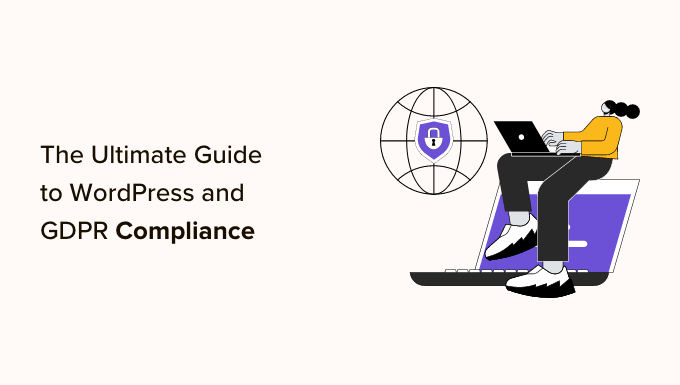
Disclaimer
We are not lawyers, and nothing on this website should be considered legal advice.
To help you easily navigate through our ultimate guide to WordPress and GDPR compliance, we have created a table of contents below:
- What Is the GDPR?
- Does the GDPR Apply to My WordPress Website?
- What Is Required of Website Owners Under the GDPR?
- Is WordPress GDPR Compliant?
- Additional Areas on Your Website to Check for GDPR Compliance
- Best WordPress Plugins for GDPR Compliance
- Final Thoughts
- Expert Guides on Making Your WordPress Site GDPR-Compliant
- Additional Resources
What Is the GDPR?
The General Data Protection Regulation (GDPR) is a European Union (EU) law that took effect on May 25, 2018. The goal of the GDPR is to give EU citizens control over their personal data and change the data privacy approach of organizations across the world.
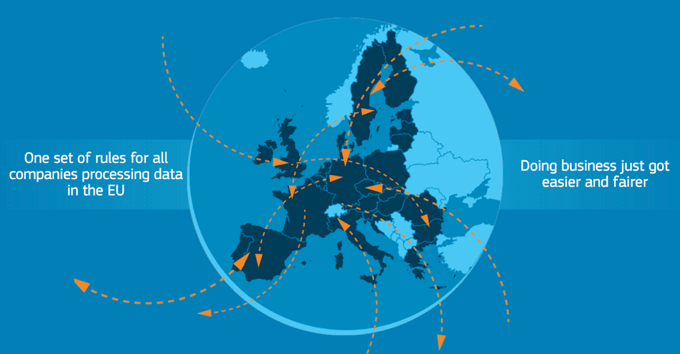
Over the years, you’ve likely gotten dozens of emails from companies like Google about the GDPR, their new privacy policies, and a bunch of other legal stuff. That’s because the EU has made big penalties for people who don’t comply with the regulations.
Businesses that are not in compliance with the GDPR’s requirements can face large fines of up to 4% of a company’s annual global revenue or €20 million (whichever is greater). This is enough reason to cause widespread panic among businesses around the world.
What Is the CCPA?
The state of California introduced similar privacy legislation on January 1, 2020, though the potential fines are much lower.
The California Consumer Privacy Act (CCPA) is designed to protect the personal information of Californian residents. It gives them the right to know what personal information is being collected about them, request its deletion, and opt out of the sale of their data.
In this article, we will focus on the GDPR, but many of the steps we list in this article will also help you become CCPA compliant.
This brings us to the big question that you might be thinking about:
Does the GDPR Apply to My WordPress Website?
The answer is YES. It applies to every business, large and small, around the world (not just in the European Union).
If your WordPress website has visitors from European Union countries, then this law applies to you.
But don’t panic. It’s not the end of the world.
While the GDPR can escalate to those high levels of fines, it will start with a warning, then a reprimand, and then a suspension of data processing.
And only if you continue to violate the law will the large fines hit.
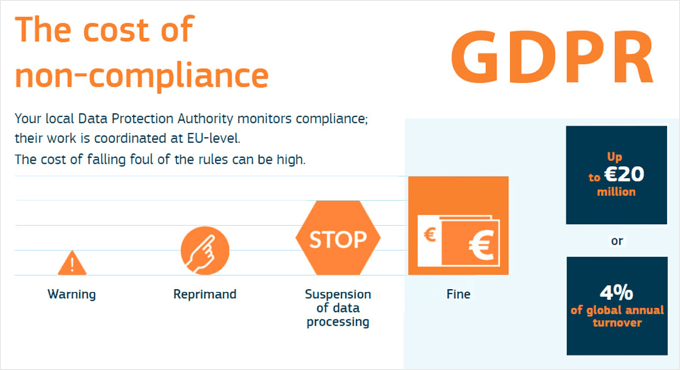
The EU isn’t some evil government out to get you. Its goal is to protect innocent consumers from reckless data handling that could result in a breach of their privacy.
In our opinion, the maximum fine is largely intended to get the attention of large companies like Facebook and Google so that this regulation is NOT ignored. Furthermore, this encourages companies to actually put more emphasis on protecting people’s rights.
Once you understand what is required by the GDPR and the spirit of the law, then you will realize that none of this is too crazy.
We will also share tools and tips to make your WordPress site GDPR-compliant.
What Is Required of Website Owners Under the GDPR?
The goal of GDPR is to protect users’ personally identifying information (PII) and hold businesses to a higher standard when it comes to how they collect, store, and use this data.
This personal data includes your users’ names, email addresses, physical addresses, IP addresses, health information, income, and more.
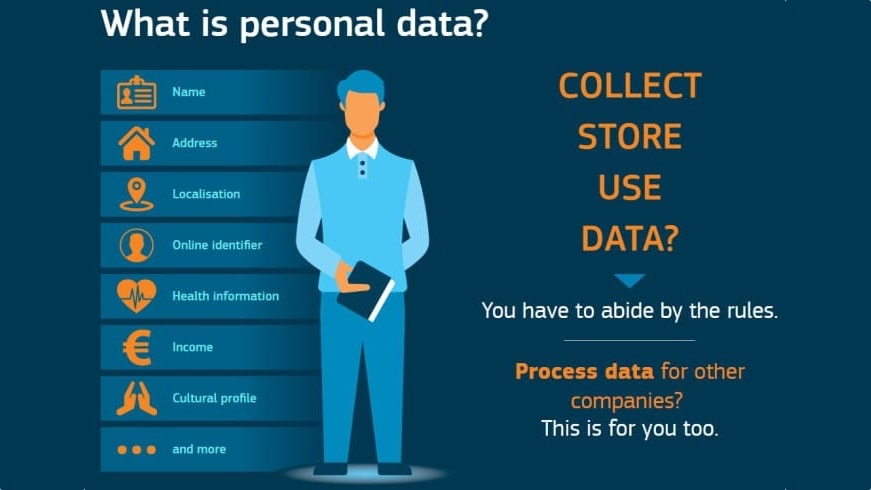
While the GDPR regulation is 200 pages long, here are the most important pillars that you need to know:
You Must Gain Explicit Consent to Collect Personal Information
If you are collecting personal data from an EU resident, you must obtain explicit, specific, and unambiguous consent or permission.
In other words, you can’t just send unsolicited emails to someone who gave you their business card or filled out your website contact form. This is spam. Instead, you must allow them to opt-in to your marketing newsletter.
For it to be considered explicit consent, you must require a positive opt-in. The checkbox must not be ticked by default, must contain clear wording (no legalese), and must be separate from other terms and conditions.
Your Users Have a Right to Their Personal Data
You must inform individuals where, why, and how their data is processed and stored.
An individual has the right to download their personal data and the right to be forgotten.
This means they have a right to demand that you delete their personal data. When a user clicks an unsubscribe link or asks you to delete their profile, you actually need to do that.
You Must Provide Prompt Data Breach Notifications
Organizations must report certain types of data breaches to relevant authorities within 72 hours unless the breach is considered harmless and poses no risk to individual data.
However, if a breach is high-risk, then the company must also inform individuals who are impacted right away.
This will hopefully prevent cover-ups like Yahoo that were not revealed until the acquisition.
You May Need to Appoint a Data Protection Officer
If you are a public company or process large amounts of personal information, then you must appoint a data protection officer.
This is not required for small businesses. Consult an attorney if you are in doubt.
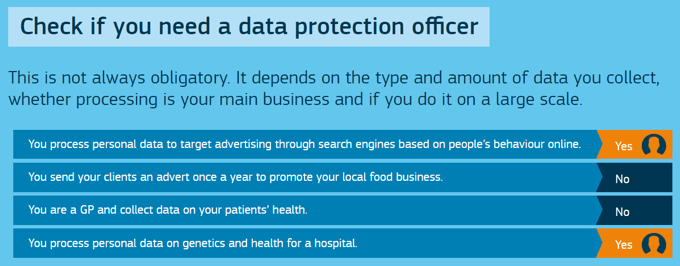
Plain English Summary of What’s Required
To put it in plain English, the GDPR ensures that businesses can’t spam people by sending them emails they didn’t ask for. Businesses also can’t sell people’s data without their explicit consent.
Businesses have to delete users’ accounts and unsubscribe them from email lists when asked. Businesses also have to report data breaches and overall be better about data protection.
Sounds pretty good, at least in theory.
But you are probably wondering what you need to do to make sure that your WordPress site is GDPR-compliant.
Well, that really depends on your specific website (more on this later).
Let us start by answering the biggest question that we’ve gotten from users:
Is WordPress GDPR Compliant?
Yes, the WordPress core software has been GDPR-compliant since WordPress 4.9.6, which was released on May 17, 2018. Several GDPR enhancements were added to achieve this.
It’s important to note that when we talk about WordPress, we are talking about self-hosted WordPress.org. This is different from WordPress.com, and you can learn the difference in our guide on WordPress.com vs. WordPress.org.
Having said that, due to the dynamic nature of websites, no single platform, plugin, or solution can offer 100% GDPR compliance. The GDPR compliance process will vary based on the type of website you have, what data you store, and how you process data on your site.
Ok, so you might be thinking, what does this mean in plain English?
Well, by default, WordPress comes with the following GDPR enhancement tools:
Comments Consent Checkbox
Before May 2018, WordPress would store the commenter’s name, email, and website as a cookie on the user’s browser by default. This made it easier for users to leave comments on their favorite blogs because those fields were pre-filled.
Due to the GDPR’s consent requirement, WordPress has added a consent checkbox to the comment form.

The user can leave a comment without checking this box. However, they will have to manually enter their name, email, and website every time they do so.
Tip: Make sure that you are logged out when testing to see if the checkbox is there.
If the checkbox is still not showing, then your theme is likely overriding the default WordPress comment form. Here’s a step-by-step guide on how to add a GDPR comment privacy checkbox in your WordPress theme.
Personal Data Export and Erase Features
WordPress offers site owners the tools they need to comply with the GDPR’s data handling requirements and honor users’ requests for exporting personal data as well as removal of users’ personal data.
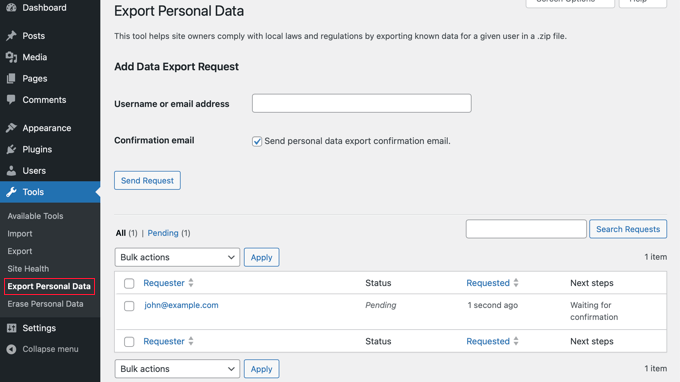
The data handling features can be found under the Tools menu inside WordPress admin. From here, you can go to Export Personal Data or Erase Personal Data.
Privacy Policy Generator
WordPress comes with a built-in privacy policy generator. It has a pre-made privacy policy template and offers you guidance on what else to add. This helps you be more transparent with users in terms of what data you store and how you handle their data.
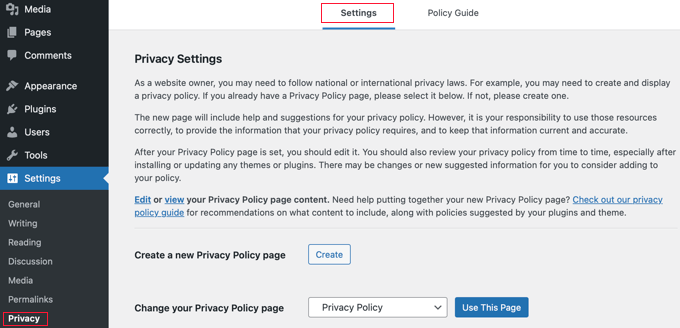
You can learn more in our guide on how to create a privacy policy in WordPress.
These three features are enough to make a default WordPress blog GDPR-compliant. However, your website will likely have additional areas that will also need to be in compliance.
Additional Areas on Your Website to Check for GDPR Compliance
As a website owner, you might be using various WordPress plugins that store or process data, and these can affect your GDPR compliance. Common examples include:
Depending on which WordPress plugins you are using on your website, you will need to act accordingly to make sure that your website is GDPR compliant.
A lot of the best WordPress plugins have added GDPR enhancement features. Let’s take a look at some of the common areas that you will need to address.
Google Analytics
Like most website owners, you are likely using Google Analytics to get website stats. This means that you might be collecting or tracking personal data like IP addresses, user IDs, cookies, and other data for behavior profiling.
To be GDPR compliant, you need to do one of the following:
- Anonymize the data before storage and processing begins.
- Add an overlay that gives notice of cookies and asks users for consent prior to tracking.
Both of these are fairly difficult to do if you are just pasting Google Analytics code manually on your site. However, if you are using MonsterInsights, the most popular Google Analytics plugin for WordPress, then you are in luck.
They have released an EU compliance addon that helps automate the above process.

MonsterInsights also has a very good blog post talking about about the GDPR and Google Analytics. This is a must-read if you are using Google Analytics on your site.
Contact Forms
If you are using a contact form in WordPress, then you may need to add extra transparency measures. This is especially true if you are storing the form entries or using the data for marketing purposes.
Here are some things to consider when making your WordPress forms GDPR-compliant:
- Get explicit consent from users to store their information.
- Get explicit consent from users if you are planning to use their data for marketing purposes, such as adding them to your email list.
- Disable cookies, user-agent, and IP tracking for forms.
- Comply with data deletion requests.
- If you are using a SaaS form solution, make sure you have a data processing agreement with your form providers.
The good news is that you don’t need to organize a data processing agreement if you are using a WordPress plugin like WPForms, Gravity Forms, or Ninja Forms.
These plugins store your form entries in your WordPress database, so to stay GDPR compliant, you just need to add a consent checkbox with a clear explanation.
WPForms, the contact form plugin we use on WPBeginner, has several GDPR enhancements to make it easy for you to add a GDPR consent field, disable user cookies, disable user IP collection, and disable entries with a single click.
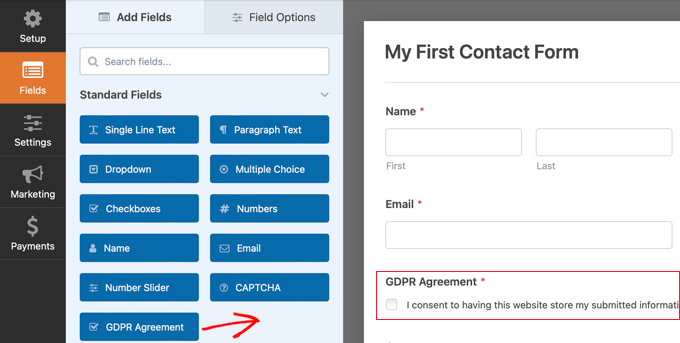
You can see our step-by-step guide on how to create GDPR-compliant forms in WordPress.
Email Marketing Opt-in Forms
Similar to contact forms, if you have any email marketing opt-in forms like popups, floating bars, inline forms, and others, then you need to make sure that you get explicit consent from users before adding them to your list.
This can be done by either:
- Add a checkbox that the user has to click before opt-in.
- Simply require double-optin to your email list.
Top lead-generation solutions like OptinMonster have added GDPR consent checkboxes and other necessary features to help you make your email opt-in forms compliant.
You can read more about GDPR strategies for marketers on the OptinMonster blog.
eCommerce and WooCommerce Stores
If you are using WooCommerce, the most popular eCommerce plugin for WordPress, then you need to make sure your website is in compliance with the GDPR.
Luckily, the MonsterInsights team has prepared an in-depth guide on how to make a WooCommerce store GDPR compliant.
Retargeting Ads
If your website is running retargeting pixels or retargeting ads, then you will need to get the user’s consent.
You can do this by using a plugin like WPConsent. It blocks all tracking scripts until users give their permission, unlike basic cookie notices that just display a warning.

The plugin handles popular services like Google Analytics and Facebook Pixel while keeping detailed consent records, so you can run your marketing campaigns knowing you’re fully compliant.
You can find detailed instructions in our guide on how to add a cookies popup in WordPress for GDPR/CCPA.
Google Fonts
Google Fonts are a great way to customize the typography on your WordPress website.
However, Google Fonts has been found to violate GDPR regulations. That’s because Google logs your visitor’s IP address each time a font is loaded.
Luckily, there are a few ways to handle this so your website is GDPR-compliant. For example, you can load your fonts locally, replace Google Fonts with another option, or disable them.
You can learn how in our guide on how to make Google Fonts privacy-friendly.
Best WordPress Plugins for GDPR Compliance
There are several WordPress plugins that can help you automate some parts of GDPR compliance.
However, no plugin can offer 100% compliance due to the dynamic nature of websites.
Beware of any WordPress plugin that claims to offer 100% GDPR compliance. They likely don’t know what they are talking about, and it’s best for you to avoid them completely.
Below is our list of recommended plugins for GDPR compliance:
- WPConsent automatically blocks all tracking scripts until visitors give permission, keeps detailed records of user consent, and includes easy-to-customize privacy banners to keep your site compliant. There’s also a free version of WPConsent available.
- If you use Google Analytics, then we recommend you use MonsterInsights and enable their EU compliance addon.
- WPForms is the most user-friendly WordPress contact form plugin and offers GDPR fields and other features.
- Cookie Notice is a popular free plugin for adding an EU cookie notice, and it integrates well with top plugins like MonsterInsights and others.
- GDPR Cookie Consent lets you create an alert bar on your site so the user can decide whether to accept or reject cookies and covers CCPA as well as GDPR.
- WP Frontend Delete Account is a free plugin that allows users to automatically delete their profile on your site.
- OptinMonster is advanced lead generation software that offers clever targeting features to boost conversions while being GDPR compliant.
- PushEngage lets you send targeted push messages to visitors after they leave your site and is fully GDPR compliant.
- Smash Balloon gives you a GDPR-compliant way to embed live feeds and show posts from Facebook, Twitter, Instagram, YouTube, TripAdvisor, and more.
- Novashare provides a way to let users share your content on social media without collecting their personal data or placing cookies.
You will find more options in our expert pick of the best WordPress GDPR plugins to improve compliance.
We will continue to monitor the plugin ecosystem to see if any other WordPress plugin stands out and offers substantial GDPR compliance features.
Final Thoughts
The GDPR has been in effect since May 2018.
Perhaps you have had your WordPress website for a while and have been working towards GDPR compliance. Or you may be just starting out with a new website.
Either way, there is no need for panic. Just continue to work towards compliance and get it done ASAP.
You may be concerned about the large fines. Remember that the risk of being fined is minimal. The European Union’s website states that first, you’ll get a warning, then a reprimand, and fines are the last step if you fail to comply and knowingly ignore the law.
Remember that the EU is not out to get you. They are doing this to protect user data and restore people’s trust in online businesses.
As the world goes digital, we need these standards. With the recent data breaches of large companies, it’s important that these standards are adapted globally.
It will be good for all involved. These new rules will help boost consumer confidence and, in turn, help grow your business.
We hope this tutorial helped you learn how to become GDPR-compliant on your WordPress blog. You might also like to see our expert guides on how to make your website GDPR-compliant.
Expert Guides on Making Your WordPress Site GDPR-Compliant
- How to Add a GDPR Comment Privacy Opt-in Checkbox in WordPress
- How to Add a Cookies Popup in WordPress for GDPR/CCPA
- How to Know if Your WordPress Website Uses Cookies
- How to Create GDPR-Compliant Forms in WordPress
- How to Keep Personally Identifiable Info Out of Google Analytics
- How to Make Google Fonts Privacy-Friendly
- How to Disable Google Fonts on Your WordPress Website
- How to Add a Privacy Policy in WordPress
If you liked this article, then please subscribe to our YouTube Channel for WordPress video tutorials. You can also find us on Twitter and Facebook.
Legal Disclaimer
We are not lawyers, and nothing on this website should be considered legal advice. Due to the dynamic nature of websites, no single plugin or platform can offer 100% legal compliance.
When in doubt, it’s best to consult a specialist internet law attorney to determine if you are in compliance with all applicable laws for your jurisdictions and your use cases.
Additional Resources
- GDPR Hysteria Part I and Part II by Jacques Mattheij
- Data Protection Infographic by the European Commission
- Principles of the GDPR by the European Commission
- GDPR and MonsterInsights – everything you need to know about Google Analytics GDPR compliance
- GDPR Enhancement Features for WPForms – everything you need to know about GDPR compliance for your WordPress forms
- WooCommerce and the GDPR – everything you need to know about GDPR compliance for your online store
- OptinMonster and the GDPR – everything you need to know about GDPR compliance and email marketing opt-in forms
If you liked this article, then please subscribe to our YouTube Channel for WordPress video tutorials. You can also find us on Twitter and Facebook.





Abin
Seems it is the lengthy process to correct all the checks against each clause, do we have any plugin available to do correction across the WordPress blog?
Prithvi Raj
This is impossible to enforce.
Who is going to go around and check if every single site is following this?
What are newbie website owners going to do?
It is hard enough to create a website and get a few people to come and read, and now you also have to deal with rubbish like this?
To put it in plain English, the EU intended that big giants like Google and FB don’t screw with data.
This law is not for the average Joe. There are hundreds of laws ordinary people break everyday by visiting simple websites, and doing simple thing online. Nobody can enforce laws like GDPR on small business owners.
If you’re getting big, you definitely need to comply, it also makes sense, if you’re bigger, you have more resources.
Prithvi
I doubt if this GDPR can be enforced for small businesses, does the EU plan on going after every single small website?
I’m not based in the EU, this regulation does not apply to me, at least not at this level (I’m a small business).
Even if it does apply, I can’t make any changes for every single regulation that comes about in different countries.
I’d like to see how this plays out over the years, it is primarily meant for giants, not for ordinary people.
Jeanne
Thanks for the article! I am glad to know the WP is all over this topic.
Geoff
The Ginger plugin works, it is simple to use and will block 3rd party cookies if the user wishes to not accept cookies but still see the website in question.
Christophe Huget
Hello, I use Iubenda to manage my Privacy Policy, the page is not physically on our website, it’s hosted on Iubenda.com. There’s no option to add a link to an external link.
owolabi Thankgod
I was sent a message by google that I should log into my adsense account and accept their new privacy policy and I have done that
Is this same as GDPR because I am getting increasingly confused after reading this article
Please what am I to do to make my wordpress site GDPR complaint because as for me, i have not done anything whatsoever.
Guust
The article says there are fines for companies, so what if my business is not carried on by a company?
And what about hobby websites and blogs, as in non-business websites?
Either the article is not complete or misleading?
Can you clarify?
Thanks
Nanette Irvine
Thank you for your informative article. I have a question in regard to a blog I write. I have a self hosted Wordpress site with a Divi theme. It is not a business, no marketing, no advertising – purely sharing a personal journey. I do offer people the opportunity to receive a notice when the next post is up. Their name and email address is stored in Aweber. Do I have to have Privacy notice etc for GDPR compliance?
Mamun
Very informative article. Really I was confused about the term GDPR. Now it’s clear to me…Thanks buddy
Bill
I disagree with assuming the EU can dictate to a business without a physical location in an EU country. This is a sovereignty issue most US citizens would have issue with like the tea tax which basically started the American colonies fight for independence. The EU cannot globally criminalize an action they do not like and penalize a US citizen, or other citizen outside their umbrella of power, based on such action. To say they can is the height of socialist arrogance.
Nor does the EU have dominion over the internet. If they do not like the way the rest of the world does business they are free to lock their coddled citizens in a make believe world much like the Chinese do.
JC
True indeed but then there is DMCA which is an American law designed to protect copyright that people also follow regardless of soveriegnty. And Americans seem not to fight paying tax abroad even when their physical location and employment does not fall under American jurisdiction.
Geoff
Of course the EU can criminalise certain actions globally.
Currently – The sale of illicit goods to the EU can be made illegal and any EU police force make arrests for certain actions carried out by people entering the EU.
The point is, this is a step towards protecting the data of anyone residing within the EU (even non-EU nationals). If a US based organisation releases data that is personal to me for their own gain or because they did not protect it properly – they should be penalised.
Nathan
Yes! I thought I was the only one who’s thinking this way. Is there a legal precedent for something like this? A citizen from the EU visits my site and all of the sudden they have the right to legislate what I can and can’t do? I think everyone is jumping on the GDPR train because it means more work (i.e. more money) for developers. Is anyone else willing to just say that the emperor doesn’t have any clothes?
Tony Tremblay
I don’t think they will go after anyone outside the Euro zone. What they could do howerver is force Google to integrate them in the search engine ranking factors. This way, every website could be affected…
John
Can we choose to block business in Europe? There’d be ZERO reason for me to even come up over there… I don’t even want their money!
Magrt
Sadly that’s more problems for you.
Apparently EU has a rule, that will take effect this year that prohibits geoblocking. Am not a lawyer but basically that rule will prevent you from blocking out EU members from your site and attract fines .
Bill
Yes John, you most certainly can block all EU based traffic and forget the whole mess.
Latunde
Thank you for sharing this awesome information
GeeLew Grinds Carpentier
GDPR understanding is real right now
Amanda
Hi, thank you all, Editorial Staff, SO much for this wonderful and helpful article, with all the helpful links and resources!! And I am so grateful to see a mostly positive and thankful response from our fantastic community of bloggers. I am so proud to be a part of this. And I really love your respectful treatment of the “spirit of this law.”
Joe
This was fantastic! I only wish it included AdSense, as a lot of site owners use that, too.
nancie
Thank you! Was looking for something simple like this for weeks…
Amar Ilindra
Thanks for the detailed guide.
But I feel you missed Google Adsense part.
For EU users, we need to get consent for personalized/non-personalized ads.
It would be really helpful for people if you update the article with the changes we need to make with Adsense.
WPBeginner Support
Hi Amar,
AdSense has issues GDPR related guidelines for publishers. Basically, you will need to disclose your ads in the privacy policy and cookie usage. You will need to show a cookie popup to get user consent.
Admin
Mike
What if a person’s business is only local to Western Canada
Geoff
If that business interacts with a person residing within the EU – then yes they do.
Lawrence Elliott
What about using the Facebook Comments plugin? Is that in compliance? If not, how can we make it so?
WPBeginner Support
Hi Lawrence,
All Facebook embeds set cookies and track users across the web, you will need to disclose this information and get explicit user consent for those cookies.
Admin
Una
Thank you so much for this very useful article.
Editorial Staff
Glad you found it helpful
Admin
Dawn Daniel
Very good Article Thank you sharing this informative article. easy to understand
balu
I don’t use Google Analytics plugin in wordpress. But I placed Google Analytics code in header file of Wordpress Theme. What can I do for this problem.
WPBeginner Support
Hey Balu,
You will still need to comply with the GDPR by manually adjusting settings.
Admin
Clare
This WAS plain English. Thank you.
Editorial Staff
You’re welcome
Admin
David Lightfoot
Well that’s just brilliant. In order to eliminate spam, they have now set it up so every website, that I have ever sent my email to, anywhere in the world is going to email me some kind of spam about their “new privacy rules”. Idiots.
C.J. Haynie
Thank you so much for putting this together! It’s been a big help. I just run a personal blog but have managed to change a few of my plugins to be more compliant. I need to look at monster insights about their free version of their addon, but I think for the most part I should be fine.
Cheers to you all! Take care of yourselves.
Take care of yourselves.
Suzanne
“If your website has visitors from European Union countries, then this law applies to you.”
Correction, “If your website has visitors from European Union countries, then this law applies to THEM.”
This article makes no reference to which countries have treaties with the EU that would allow the EU to usurp their sovereignty to enforce, prosecute, and fine people within them, for having the “wrong check boxes” in their contact forms.
The EU doesn’t get to swallow the earth like some amoeba. I am neither a citizen, serf, nor resident of the EU. My websites are all hosted in non-EU countries. If you can show me the list of countries that have signed on to a treaty to allow the EU to prosecute people for non-GDPR-approved check boxes within their borders, I’ll consider choosing or updating my own plugins/contact forms, thank you very much, or updating my .htaccess to block all EU IP addresses from visiting.
And that’s how it’s played.
Jean Jeudi
Good to know that your site can do without visitor from Europe. I reckon your are not providing important services or goods. Maybe you should read a bit more what the EU requires from companies tar getting European customers. Most of the topics are common sense e.g not to share information you receive with third parties without a previous approval. Similar laws exist ever since for sharing photos showing third parties in social media.
I know that I am already a transparent person thanks to google and friends but at least I want to have the right to check what they have collected on me and to stop distribution of this information
Geoff
I’m afraid the EU does… if you want to play fast and loose with personal data, feel you have a right to send me crap emails me if I didn’t sign up, store information about me with permission, release information about me to 3rd parties (intentionally or not)… then you shouldn’t have a website.
Chris Bukoski
This post seems relevant for wordpress.org (as mentioned). What about wordpress.com sites?
Thanks!
Jonathan Soto Gregg
This is important information. Thanks for sharing. Can i share this in my blog?
Editorial Staff
Hi Jonathan, we don’t allow folks to copy our entire articles. However if you want to link to our article from your own original content blog post, then absolutely
Admin
Gidon Ariel
Great article, I will certainly try to find it and refer to it if I ever need to worry about this.
But since you say that worst case, i will first be given a warning, I will focus on other things and be motivated by real 3rd degree urgency then instead of spending hours now – a few hours before the “deadline” – for something that will probably never affect me.
Sorry chums, this sounds like Bug2000’s little brother.
Cheers!
Jasmin Patterson
First off, thank you for explaining this so simply!
Second, a question. I have a small self-hosted WP blog and I send new posts and updates to my readers but don’t sell them anything at this point. I’m using the Mailmunch plug in for opt-in forms, integrated with my Mailchimp email list.
If I enable double-opt in for my email newsletter opt-in forms, do I need to also have legal language on each of those opt-in forms specifically stating that users information will be stored in my email marketing client and that they can unsubscribe at any time? Or is the double opt-in sufficient to be compliant? Should I perhaps include storage information in a privacy policy also/instead?
Thanks!
Jose E. Marques
Excelent article. Exactly what everybody needs to hear. Keep up the excelent work. Blessings.
Chirag artani
GDPR is now started, I’ll update new policy in my website because it’s important and we are legal workers !
Emily
Thank you so much! I updated WordPress and am not seeing the comment consent, is it a setting that needs to be turned on I cant seem to find it if so. Maybe because I am using Genesis? Any help would be appreciated. Thanks again
WPBeginner Support
Hi Emily,
Please see our article on how to add comment privacy checkbox in WordPress.
Admin
Koshy George
Is there a way I can block EU users from accessing my wordpress site or put a splash screen saying EU users are not welcome?
vas
Thank you!
Ben
Best guide! Thanks so much.
Aimee
I have a blog that doesn’t do ANY monetizing. Actually it doesn’t get many views because I only do blogging as a hobby so far. What exactly do I need to do to be compliant with the new law? Does the law affect me if I”m not a business and not making money from my blog?
WPBeginner Support
Hi Aimee,
It depends on plugins and tools you use on your website and how they collect and store personal information.
Admin
Hannah
Fantastic article! Luckily we’ve already implemented most of what you suggest for both ourselves and our clients, but we had a very longwinded way of getting there. It would have been so much quicker and easier if we’d read your clear and straightforward article first! WordPress seems to have been a bit late to the party in terms of GDPR compliance but at least we’re there now – just in the nick of time!
Kresten Bergsøe
The Cookie Notice plugin is NOT GDPR compliant – not even compliant with current cookie legislation in the EU.
Before you set a cookie you have to have consent – Cookie Notice does not support the blocking of cookies at all.
Klemen
Pheew. Feel really good to read this article. Honestly, I’m dealing with this late and learning about this honestly scared the shit out of me and got me overwhelmed. Happy to hear that it’s not the end of the world and that if I take a step at a time towards compliance it’s gonna be all right.
Ashutosh
I had the privacy policy page created before all of this. So can I just do “Use this page” in the Privacy settings of WP or should I create a new page and delete the old one?
Editorial Staff
You can just update your old privacy policy page to add new text as needed.
Admin
Joeri
Hi,
I have a WordPress shop. How can I see that I have cookie tracking?
Thanks.
Mette Bruyant-Langer
Hi, this is an excellent article and a great practical and respectful approach to GDPR.
I’m a 58 year old Danish business lawyer with a lifetime corporate background in European medico industry and having gone olderpreneur with my husband 4 years ago. So I KNOW about European data protection from the early 2000 days.
Now, I’m getting a grip on GDPR for our website and SaaS application to make sure we’re compliant. And your article turned out to be the perfect place to start.
So thanks, and a good day to you.
/Mette
Nuala
Thank you for the article.
Laura
Hi, thank you for this post.
However, on out website, i do not see the extra checkbox: save my name, email and website in this browser etc.
Any idea why this is not shown?
Thank you very much!
Editorial Staff
The checkbox will need extra configuration on your theme. We’re working on creating a tutorial on how to do that and then will be updating this guide as well.
Admin
Claudia
Thank you! That would really help!
DANIELE GALASSI
Hi great article indeed.
wordpress self upgraded tonite to last version, but still my comments box don’t show the GDPR checkbox.
They only show:
notify me by mail new comments
notify me by mail new posts
is there some option i should activate?
Joost
Gravtiy Forms stores entries by default. So you know…
Alex
Thank you so much for this awesome article!!!
John Nixon
Thank you for this. I’ve been trying to prepare for GDPR for months, and I thought I’d considered every aspect. It’s reassuring to see I’m about 90% clear, but your piece has pointed me to one or two things I missed. (Check box for the contact form!)
I still don’t really understand how the Wordpress data handling features work though. They don’t seem to help me find all the data (IP addresses?) that visitors may have left. As far as I can see I’m going to have to manually remove comments (with associated e-mail addresses) for anyone who asks. Is that right?
WPBeginner Support
Hi John,
Yes. Your privacy policy page should have a form where users can request access to their data and ask for its complete removal.
Admin